Oct7FactCheck: Sunday Edition

The New York Times story "Screams Without Words" painted a picture of weaponized sexual violence perpetrated against Israelis by Hamas on Oct 7. Oct7FactCheck.com has been investigating the details of this story for months, highlighting apparent plagiarism between outlets that uncritically repeat one another and doing their own deep dive into sources used by the NYT. Those sources, including the discredited first responder group ZAKA, were not sufficient to support the claims of the article - you can read Oct7FactCheck's source-by-source analysis here.
In the past week, it's come to light that not only was the sourcing of the NYT article unreliable, the reporters doing the investigation were too, pushed into the work by editors eager for a story. Reporter Pulitzer-prizewinner Jeffrey Gettleman, drafted the article based on the research of Anat Schwartz, a documentarian with no investigative journalism experience and her food writer nephew Adam Sella.
The Intercept reported: "Schwartz said she was initially reluctant to take the assignment because she did not want to look at visual images of potential assaults and because she lacked the expertise to conduct such an investigation.
Gaps in the reporting were enough for other NYT reporters to red flags, shelving a high-profile podcast intended to explore the same subject. after it was revealed that Anat Schwartz liked genocidal tweets on or about Oct7, even more more pressure was put on the news organization to hold themselves accountable. (Link: warning, genocidal language)
"Screams Without Words", and the New York Time's coverage of Israel's offensive in Gaza has played an outsized role in the public narrative. Claims of weaponized sexual violence have been presented as justification for Israel's indiscriminate violence against Gaza in the five months since, and brought before international bodies like the UN. "Screams Without Words" is part of a package of reporting from the NYT that won a Polk Award and is still eligible for consideration for a Pulitzer this spring.
In 2004 The New York Times had to retract their reporting on weapons of mass destruction by Judith Miller, and acknowledge that it was used to justify the U.S. invasion of Iraq. The systemic issues they noted in that mea culpa 20 years ago are the same issues we see today - editorial bias, rushing stories to press, poor sourcing, and lack of skepticism regarding claims from officials eager for war.
Rather than hold themselves to account and learn from their past, the NYT is focusing their energy on attempting to find the source of the leak, explicitly targeting Middle East & North Africa Collective members.Palestinian journalists like Soraya Shockley, who were told they shouldn't report on Israel and Gaza because of their ethnicity, are speaking up about the NYT's long pattern of silencing dissent.
The NYT makes it easy to cancel your subscription. They also accept feedback from their readers at nytnews@nytimes.com. You can see some of the feedback the NYT has recieved in the image below and the linked X.com thread, as well as the Writers Against the War on Gaza Instagram page
